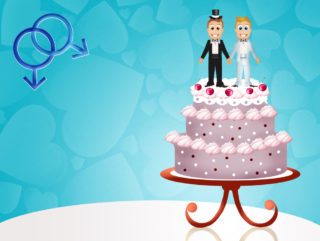
What do cake and cannabis have to do with each other? Besides the obvious late-night munchies or a great recipe for an edible, a recent Supreme Court decision involving cake impacts cannabis businesses across the nation.
The Masterpiece Cakeshop case garnered a lot of media attention—and for good reason. Not only are the facts enticing but the outcome is even more surprising.
In 2012, Masterpiece Cakeshop owner, Jack Phillips, refused to create a cake for David Mullins and Charlie Craig’s same-sex wedding. He said he would not use his talents to convey a message of support for same-sex marriage at odds with his religious beliefs. Colorado, like most states, prohibits businesses from discriminating against individuals on the bases of sex or sexual orientation. This means that Colorado businesses who are open to the public cannot refuse to serve someone because of their sexual orientation.
Mr. Mullins filed a complaint with Colorado’s Civil Rights Commission contending Masterpiece Cakeshop discriminated against him and his partner based on their sexual orientation. Mr. Mullins prevailed in front of the Commission and in state courts. Masterpiece Cakeshop appealed to the United States Supreme Court and argued Mr. Philips’ right to free speech would be violated if he were required to create a cake for the couple. Somewhat shockingly, the Supreme Court agreed with him.
The Supreme Court focused on the Civil Rights Commission treatment of Mr. Phillips and determined that the Commission had ignored and dismissed his religious freedom and freedom of speech rights. Justice Kennedy, who wrote the majority opinion, determined that “the neutral and respectful consideration to which Mr. Phillips was entitled was compromised here….The Civil Rights Commission’s treatment of [this] case has some elements of a clear and impermissible hostility toward the sincere religious beliefs that motivated his objection.”
What’s does Justice Kennedy’s opinion mean for cannabis businesses? The decision should not be read as a license to discriminate against patrons or employees based on sexual orientation (or any other protected class). The Supreme Court’s decision was very narrow and likely only applies to the facts of this case. What that means is that although Mr. Phillips’ free speech rights may have been violated, not all cases will turn out this way.
Cannabis businesses that are open to the public are prohibited from discriminating against patrons on the basis of a protected class. The Supreme Court’s ruling did not change that. Cannabis businesses, like other businesses, must provide the same services to all individuals regardless of their race, color, national origin, age, sex, or sexual orientation. Refusing to serve a customer or to provide the same services could result in hefty fines from your state’s civil right enforcement agency, lawsuits by customers, and customer boycotts.
The bottom line is to treat each customer with respect and dignity—a requirement by state governments and a good way to run a business.























